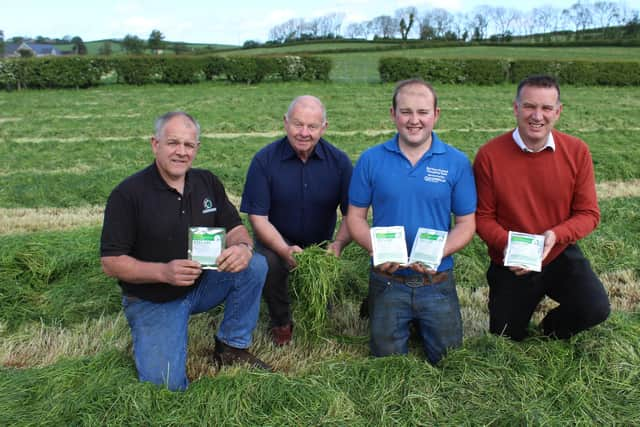Excellent start to silage season
and live on Freeview channel 276
After a 24-hour wilt the grass was picked up using a precision chop harvester and ensiled in excellent conditions.
The family farm is located at Lavin, near Dunloy, in Co Antrim.
Advertisement
Advertisement
The Jamisons milk 140 Fleckvieh dairy cows through two Lely robots. All calves are reared on farm and kept as replacements for the dairy herd or taken through to beef. Wheat is grown on farm and is fed as wholecrop silage.


Two main crops of grass silage are made annually, both destines for a silo.
“Depending on the year, we might also get the opportunity to make some third cut forage,” Adrian explained.
“There are just over 500 cattle on the farm at any one time. The cows are kept indoors the year round. So making sure that they have access to high quality forages at all times is very important.
“We normally set aside 150 acres of grass for first cut.”
Advertisement
Advertisement
The fields harvested over the past couple of days all received 2,500g of slurry per acre at the end of February with 2½cwt of bag nitrogen per acre to follow.
“The yields of grass were excellent,” David confirmed.
“And the quality of the forage was equally good.”
Adrian and David have opted to use Bio-Sil inoculant on this year’s first cut crops.
Distributor Richard Owens, from Richard Owens’ Farm Solutions, takes up the story: “Increasingly, farmers in Northern Ireland want to use an inoculant that delivers a rapid pH drop while also maximising forage quality. Minimising wastage at feed-out is another priority.
“Bio-Sil meets these requirements in a fundamentally effective way. Use of the inoculant ensures that silos can be opened within two weeks of grass being ensiled.”
Advertisement
Advertisement
He added:“For the most part, farmers using robotic milking systems keep their cows in the year round. Having access to high quality forage at all times and on a flexible basis is, therefore, very important.
“The use of Bio-Sil is particularly relevant in these circumstances.”
Richard Owens and Bio-Sil’s Frank Foster were recent visitors to the Jamison farm.
“Bio-Sil was launched in Northern Ireland last year,” Frank explained.
Advertisement
Advertisement
“Those farmers who used it were exceptionally pleased with the quality of the forage produced and the lack of waste at feed-out.
“I would like to thank Adrian and David for choosing to use the inoculant this year. Our customer base is increasing at an exponential rate at the present time.”
The treated grass will be ensiled separately on the Jamison farm. As a result, the Bio-Sil team will be able to assess the quality of the forage in the pit on a progressive basis.
“The testing work will get underway in a month’s time,” Frank Foster confirmed.
Advertisement
Advertisement
“We will be making the analysis results that we get back over the coming weeks and throughout the winter ahead freely available to farmers as they become available.”
For further information on Bio-Sil, contact Richard Owens on 07990 690857.